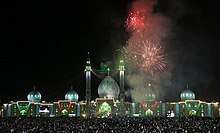Mid-Sha'ban
Mid-Sha'ban (Arabic: نصف شعبان, romanized: Niṣf Sha‘bān) or Bara'a Night (Arabic: ليلة البراءة, romanized: Laylat al-Bara’at) is a holiday observed by Muslim communities on the night between 14 and 15 Sha'ban.[1] It is regarded as a night when the fortunes of individuals for the coming year are decided and when Allah may forgive sinners. In many regions, this is also a night when prayers are arranged for forgiveness from Allah for one's deceased ancestors.[2] Additionally, Twelver Shia Muslims commemorate the birthday of Muhammad al-Mahdi on this date. [3][4]Salafi streams oppose the recognition of Mid-Sha'ban as exceptional for prayer.[5]
| Laylat al-Bara’at | |
|---|---|
 | |
| Official name | Arabic: ليلة البراءة, romanized: the quality of being guileless |
| Observed by | Muslims |
| Type | Islamic |
| Observances | Prayers for forgiveness |
| Date | Night between 14 & 15 of Sha'ban |
| Today |
Using tabular calculations |
 |
| Part of a series on |
| Islamic culture |
|---|
| Architecture |
| Art |
|
| Dress |
| Holidays |
|
| Literature |
|
| Music |
| Theatre |
|
Etymology
The 15th of Sha'ban goes by several names, depending on the country in which it is observed. Most can be categorised into two general meanings:
- Mid-Sha'ban or Half of Sha'ban. Named after the day's chronological position in the eighth month of the Islamic calendar:
- Bara'at Night. Bara'at is an Arabic noun which is roughly translated to English as either innocence, records, assignment, deliverance or salvation.
Origins
The base for celebrating Mid-Sha'ban is not without dispute. Whether or not 15 Sha'ban is regarded as a special holiday, has primarily been an issue of interpreting the Quran and classifying the Hadith.
Qur'an
Although not mentioned directly in the Qur'an, two verses are sometimes ascribed to Mid-Sha‘ban:
"Indeed, We sent it down during a blessed night. Indeed, We were to warn [mankind]. On that night is made distinct every precise matter-"[Quran 44:3–4]
According to Tafsir Ibn Kathir,[6] the more correct interpretation of this blessed night been attributed to another Islamic holy night, Laylat al-Qadr, based on additional verses.[7][8][9]
Hadith
In some hadiths of Sihah Sittah or pure six texts, this Hadith is described as the specialty of the night. Also in the other Hadith texts mention the specialty of this night. There are different standards of the hadiths and disagreements in this regard. The term, which is used in the hadeeth of the Hadith, is "Nisf Shaban" or "lilatun nisafi min Shaban" or "night of mid Shaban". It has been said in a Hadith,
The Prophet (peace and blessings of Allah be upon him) said that Allah has manifested on the night of mid-Shaban and forgiveness of all His creation except the polytheists and the envious.
— - (Ibnu Majah, As-Sunan 1/445; Bazzar, Al-Musnad 1/157, 207, 7/186; Ahmad Ibn Hanbal, al-Musnad 2/176; Ibn Abi Asim, As-Sunnah, pp. 223–224 Ibn Hibban, as-Sahih 12/481; Taabrani, al-Muzam al-Kabbir, 20/108, 22–233; Al-Mujam al-Aausat, 7/68; Baihaqi, Shu'abul Iman, 3/381; Ibnu Khuzaymah, Kitabut Tawhid 1 / 325-226.) [Sahih or Authentic narrator chain]
Another Hadith says,
Ayesha (R) said, one night I did not find the Prophet (sallallahu 'alaihi wa sallam), and I went out to seek him. I noticed that he was in Jannatul Baki, lifting his head towards the sky. He said, "O Aisha! Do you fear that Allah and His Messenger will do injustice to you?" Ayesha (R) said, "No, but rather I thought that you might have gone to your wife. He said that Allah Almighty descended on the earth in the middle of the night of Shaban and forgave the sins of more people than the wool of the sheeps of the people of Kalb tribe. (Ibn Majah, As-Sunan 1/444, Hadith No. 1388). Ibnu Abi Sabrah, the only narrator of this hadith. Ahmad, Imam Bukhari and other Muhaddis accused him of being liars.
— (Ibn Hajar, Taqribut Tahzib, page 63; Tahizibut Taazib, 12 / 25–26.), [Daif/Weak, or Maudu/fabricated narrator chain]
According to different Saheeh Hadith, Muhammad used to perform fasting in this month. Sha'aban's fast was the most loved of him. He used to perform fasting in the month of Ramadan, from the first to the 15th of the month. When asked about this, he said,
"This month man's actions are being raised to the Lord Almighty. And I love that my work would be raised during my fasting."
— - (Nasa'i, As-Sunan 4/201; Albani, Sahihhut Taragib 1/24. [Hassan or better narrator chain]
Birthday of Muhammad al-Mahdi


According to Twelver Shias, Muhammad al-Mahdi, the final Shia Imām, was born on 15 Sha'ban. Shi'as celebrate Muhammad al-Mahdi's birthday on that day and perform religious acts such as prayers for the reappearance of Muhammad al-Mahdi,[10] fasting, and worship. Iranian cities are decorated on night of Mid-Sha'ban.[11][12]
Related customs
Mid-Sha'ban is celebrated in countries including India, Bangladesh, Pakistan, Sri Lanka, Lebanon, Iran, Azerbaijan, Turkey, Afghanistan, Uzbekistan, Tajikistan, Kazakhstan, Turkmenistan and Kirghistan. The Salafi Arabs do not celebrate this holiday. In the Arab world the festival is celebrated by Arabs with Sufi heritage, and Shias. In Iraq, children are given candies as they walk around their neighborhoods. Sunni Muslims in Iraqi Kurdistan and Afghanistan celebrate this holiday 15 days before Ramadan.[13] Some Muslims in Indonesia do communal zikr in mosques followed by a lecture (ceramah) led by an ustad or otherwise known in Java and Madura as a kyai. This tradition is rarely followed in Indonesia, but it is widely followed in Aceh, West Sumatra and South Kalimantan. In South Asia, Muslims make sweets (especially Halwa or Zarda) to be given to the neighbors and the poor on the evening prior to the 15th of Sha'ban.[14] This custom of distributing Halva is also practiced in Bosnia on the 15th night of Sha'ban, as well as on three other holidays: Laylat al-Qadr, Laylat al-Mi'raj and Laylat al-Raghaib.
Gregorian dates
Although the date of Mid-Sha'ban is always the same in the Islamic calendar, the date in the Gregorian calendar falls approximately 11 days earlier each successive year, since the Islamic calendar is lunar and the Gregorian calendar is solar. Hence if date falls in the first ten days of a Gregorian calendar year, there will be a second occurrence in the last ten days of the same Gregorian calendar year.
| Islamic year | Umm al-Qura predicted |
|---|---|
| 1441 | 8 April 2020[15] |
| 1442 | 28 March 2021[16] |
References
- Dinesh Bihari Trivedi; A. H. M. Zehadul Karim (1990). Law and order in upper India: a study of Oudh, 1856–1877. Northern Book Centre. ISBN 978-81-85119-83-0.
... The first significant religious occasion shabe-barat (lailat ul-barat or the night of deliverance) is held in the middle of Shaban (eighth month of the Islamic calendar) ...
- Jamal J. Elias (1999). Islam: Religions of the world. Psychology Press. ISBN 978-0-415-21165-9.
... Laylat al-bara'a ... fortune for the coming year is popularly believed to be registered in Heaven ... prayer vigils and by feasting and illumination ... oblations are made in the name of deceased ancestors ...
- "The great Shia scholar, Abu Ja'far Mohammad ibn Uthman al-Amri – Imam Reza (A.S.) Network". imamreza.net. Archived from the original on 29 September 2017.
- The Return of al-Mahdi. P11
- Muhammad Umar Memon, Aḥmad ibn ʻAbd al-Ḥalīm Ibn Taymīyah, Ibn Taimīya's struggle against popular religion: with an annotated translation of his Kitāb iqtiḍāʾ aṣ-ṣirāṭ al-mustaquīm mukhālafat aṣḥāb al-jaḥīm, Mouton, 1976, ISBN 978-90-279-7591-1,
... among the Salaf as well as those among the khalaf, however, reject any excellence for the night in question and challenge the authenticity ... Marking mid-Sha'ban by fasting is without foundation, nay marking it is disapproved of. Likewise, celebrating it by preparing ...
- Quran 97:1–5
- Quran 2:185
- Fatwa by the Permanent Committee
- "Marking the month of Sha'ban – Birth of Imam Mahdi". shafaqna. Retrieved 3 June 2015.
- "Iranians celebrate birth of Imam Mahdi". Press TV. Retrieved 26 May 2015.
- "A Dazzling Night in Iran Embellished with Spirituality". Real Iran. Retrieved 26 May 2015.
- "Live Chennai: Shab-E-Barat – Festivals of India – Festivals in India – Muslim Festivals – Ramzan – Id-ul-fitr – Bakrid, Eid Mubarak". livechennai.com.
- "About: Shab-e-barat (شب برات)". Events in Karachi – Latest Event Updates- Articles – About Karachi.
- "Shaban 1441". islamicfinder.org. Retrieved 28 February 2020.
- "Shaban 1442". islamicfinder.org. Retrieved 28 February 2020.